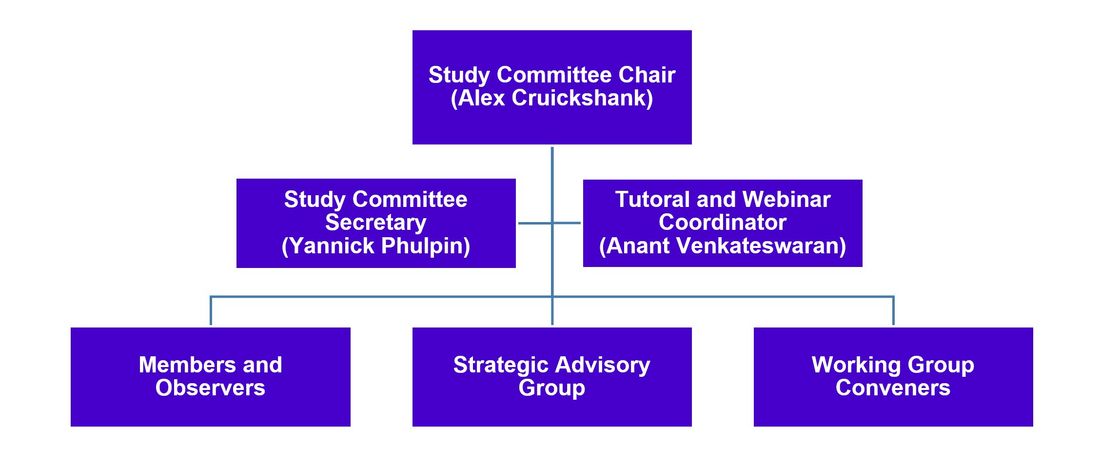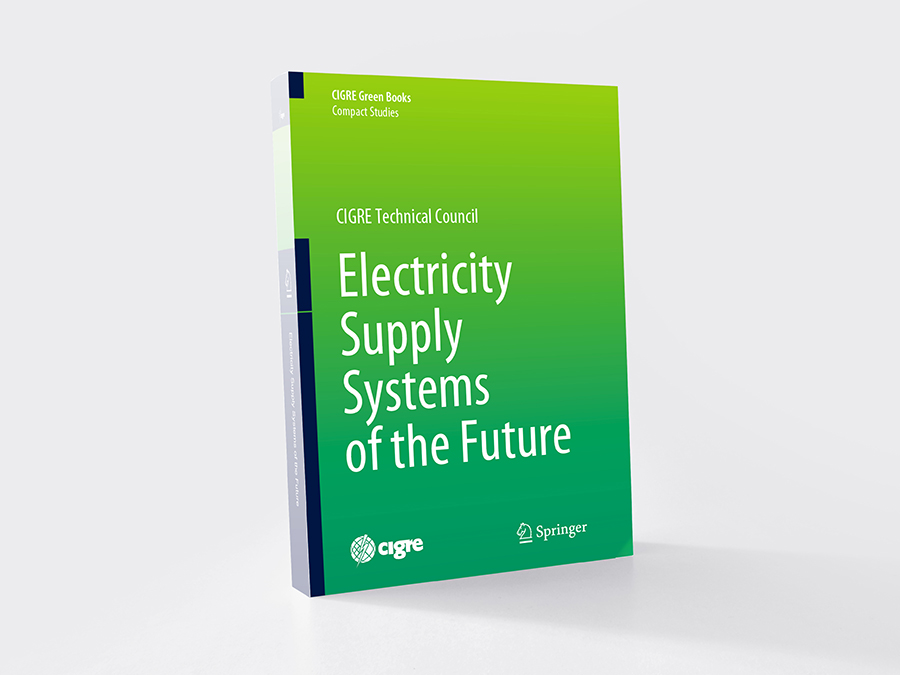Electricity markets and regulation
by Alex Cruickshank, Chair & Yannick Phulpin, Secretary
Introduction
Electricity Markets, like the objectives of the entities and systems that those markets serve, continue to evolve. Internationally, markets have developed and have successfully provided economic signals that support the development and operation of wholesale electricity. The success of those markets have allowed for the recognition, development and successful implementation of new technologies and solutions for supplying and purchasing electricity. This success has brought new demands on those markets.
Study Committee C5 is expanding its focus to report on and discuss the regulatory and market issues associated with the changing electric power industry which includes both transmission and distribution. SC C5 members provide needed insight to the wide variety of market requirements involved with providing reliable energy with the changes in renewable energy, distributed energy resources, and consumer choice. Moreover, the changing landscape of behind-the-meter supply and the growing recognition for different levels of reliability and flexibility provides changes in requirements and changes in market designs to properly incentivise the new providers and consumers, wherever they may be.
Scope of work
The scope of the Study Committee is to analyse the impacts on the planning and operation of electric power systems of different market approaches and solutions; and of new structures, institutions, actors and stakeholders. The role of competition and regulation in improving end-to-end efficiency of the electric power system.
Structure of SC C5

Study Committee Structure
SC C5 Membership
The current membership of the Study Committee is available here. The Study Committee has 24 ordinary members and 17 observers. Together, the members and observers represent 41 different countries.
WG membership
The Working Group membership and demographics are examined in March of each year. The report for 2020 noted that the Study Committee had 8 Working Groups (reduced to 6 at the time of this report). There were 283 members in the Working Groups. The WG members were spread across 44 countries. SC C5 Working Groups had 18% female membership and a smattering of NGN members.
Principal areas of interest
The Study Commitee focuses on three key areas:
- Market structures and products (market design, physical/financial markets and interaction, isolated and interconnected systems).
- Market approaches and tools (demand/price forecasting, financial risk management, demand management and active customer integration).
- Regulations (regulatory objectives, regulatory approaches, transmission pricing, ancillary service pricing, reliability and economics).
In addition, the Study Commitee is interested in:
- Changes in regulatory roles and jurisdiction related to the interaction between the transmission system and the distribution system.
- The role of markets, including: the integration and coordination of distributed energy resources; the impact on wholesale market price formation caused by non-wholesale market participants; the need for and development of distribution service providers.
- The impact of emerging technologies on system operations.
- Market clearing procedures, techniques and principles used to take advantage of the flexibility of aggregating large numbers of end-users.
- Potential market rule changes to address changes in traditional ancillary service products.
Areas of attention
The current areas of attention, which are reflected in the current Working Groups, are listed below.
Demand Side Management (DSM) and Demand Response (DR) solutions and their integration into existing market structures
Innovative DSM and DR mechanisms have become a priority in the transition to low carbon energies. The role of transmission system operators (TSOs) and distribution system operators (DSOs) in managing DR services (e.g. operational time frames, service procurement mechanisms, payment methods, and activation of such services). The development of DR auction markets (time frame, bid structure, and pricing mechanisms.)
- WG C5.26: Auction Markets and Other Procurement Mechanisms for DR Services
- WG C5.31: Wholesale and Retail Electricity Cost Impact of Flexible Demand Response
Market Drivers
The purposes for market changes, the initiators of those changes, the processes for selecting a proposed change and the success of changes in meeting their objectives.
- WG C5.27: Market Design for Short-Term Flexibility (completed during 2020)
- WG C5.28: Energy Price Formation in Wholesale Markets
- JWG C5/C6.29: New Electricity Markets, Local Energy Communities
Smart Grid Market Evaluation
The market and the strategic values associated with smart grid technologies.
- WG C5.24: Exploring the Market-based value of Smart Grid developments (completed during 2020)
Environmental Regulation in the Electricity Sector
A variety of regulatory or market-based approaches are implemented to manage environmental constraints, such as reductions in greenhouse gas emissions.
- WG C5.32: Carbon Pricing in Electricity Markets
2020 Paris Session
Webinar/Paper Session
The CIGRE 2020 eSession did not include a general discussion meeting as the Technical Council considered that it would be impossible as a web meeting. Instead, each Study Commitee presented a webinar presenting the papers that would have been discussed.
SC C5 presented 48 papers over two days, including 2 papers that were part of the NGN showcase.
The papers, updated if the authors choose to do so, will be part of a normal session in 2021.
Workshop
The Study Commitee convened a workshop, in conjunction with SC C2 to examine large disturbances in energy market and systems. The Large Disturbance workshop has been convened by CIGRE during the Paris Session for many years and recently has included market disturbances.
Panels
The Study Commitee also convened two panel sessions.
One, in conjunction with IEEE, examined pilot projects implementing blockchain technology to manage electricity-related trades.
The other panel featured presentations of four case studies of blockchain applications in the electricity sector.
Tutorial
A tutorial on the findings on market-design for short-term flexibility was included in the session and featured views from practitioners regarding this topic.
Topic of current and recent Working Groups
WG C5.24: Exploring the Market-based value of Smart Grid developments
The purpose of this Working Group is to explore and provide the types and (ranges of) the market-based and strategic values associated with smart grid technologies and propose methods for accounting for these values.
WG C5.26: Auction Markets and Other Procurement Mechanisms for DR Services
One of the key features of smart grids is that they have strengthened the interest in demand-side resources such as distributed generation, on-site storage, and DR. How the DR services are procured- via auction markets, long-term contractual mechanisms, or other, and implemented in market operations in various electricity markets around the world is worth studying and understanding. This Working Group (WG) will identify the various complexities in different DR procurement mechanisms, and their operational aspects. The WG will identify the barriers in different models and develop a global outlook for management of DR services.
WG C5.27: Market Design for Short-Term Flexibility
Flexibility is a characteristic of capacity. If we view capacity as the possibility (or option) to either consume or produce electrical energy, then flexibility is the capability to use this capacity freely and to adapt the capacity responding to price signals. The more flexible the capacity (in terms of speed lack of constraints), the better its ability to serve the short-term needs of the power market.
The Work Group will conduct a survey to quantify market design options – both those market design options currently being used to provide short term flexibility as well as market design options that are being considered to address future needs. Drawing on the experiences from various market designs will provide key insights into market design concepts as well as being potentially useful for other markets with very different basic designs.
WG C5.28: Energy Price Formation in Wholesale Electricity Markets
The structure of wholesale electricity markets impacts how prices are formed, and how accurately prices reflect the true cost of serving load. As the dynamics of the electric power sector change – especially the characteristics of the generation mix – there is a need to evaluate whether pricing mechanisms are adequately valuing wholesale electricity.
This Working Group will analyse price formation with a focus on wholesale energy markets. The group will gather information about pricing mechanisms as they exist today and examine if these mechanisms are working as desired. For example, are energy markets incentivising desired operational behaviour? Are out-of-market (uplift, make-whole) payments impacting desired price signals? Are there attributes not currently valued in energy markets – like flexibility or environmental externalities – that should be considered in price formation? After evaluating today’s energy pricing landscape, the Working Group will discuss potential enhancements that could more accurately reflect the true cost of wholesale energy.
JWG C5/C6.29: New Electricity Markets, Local Energy Communities
Today it becomes more and more efficient to develop local energy systems based on distributed energy resources (DER) allowing customers to become energy suppliers. Adding locally batteries to dispersed generators, stationary or within electric vehicles, allows for a group of citizens or more generally for any group of consumers, to settle their own local structure for their supply of electricity, becoming a local energy community (LEC). With the digitalization of economy and some specific tools such as block chain, each of this group may organize easily its local market. Depending on national regulation, LEC can or not own and/or operate the network, or even target to be physically balanced, enabling islanded operation. As underlined by the recent Clean Energy Package in the EU, regulation is under development for LEC.
This JWG will liaise with parallel JWG D2/C6.47 “Advanced Consumer-Side Energy-Resource Management Systems”.
WG C5.30: The Role of Block Chain Technologies in Power Markets
This Working Group consists of two streams of work.
The first phase, Exploration, is an assessment of the potential value and uses of block chain technologies in energy markets and power systems. This will include an explanation of how they work and some simplified examples of possible applications. Specifically, this stage will:
- gather information on the characteristics of distributed ledger products.
- consider the range of potential applications in electricity both for financial and physical parameters
- consider the implications for the electricity industry: efficiency and scope for new approaches with vastly more transactions - vs - disruption and the risk of being bypassed
The second phase, Assessment, will be a review of a range of trials and examples of early adoption of projects that use block chain, to document their value and practicality. During the project, a set of assessment criteria will be developed and applied to the trials and examples.
WG C5.31: Wholesale and Retail Electricity Cost Impact of Flexible Demand Response
The study aims to provide an international view of the connection between retail programs/rate structures to costs incurred in the provision of electric service that may be impacted by flexible demand response (DR). Demand response (DR) includes all forms of demand-side response, which refers to a change in load coordinated with system or market needs. The change in load behind the utility meter of the customer can stem from end-use equipment, storage, PV, and other forms of distributed generation.
The study also aims to analyse the methods applied in practice to either directly or indirectly reduce costs, by service territory, in both regulated and competitive market environments. Introductory background on the functions that flexible DR supports and how it is factored into system planning and/or operations will be addressed at a high-level to provide context for presentation of findings by service territory.
The study will also identify and clarify terminology, in order to assist data collection and presentation of findings with consistency to support ready comparison of findings across service territories.
WG C5.32: Carbon Pricing in Wholesale Electricity Markets
This Working Group will analyse mechanisms for pricing carbon and other greenhouse gases in wholesale electricity markets. While other studies such as those by the World Bank provide an overview of existing and emerging carbon pricing initiatives, this Working Group will focus specifically on their impacts on electricity markets.
The group will gather information about carbon pricing mechanisms as they exist today and examine if these mechanisms are working as desired. For example, are market participants and regulators supporting the market approach or not and what types or border adjustment mechanisms are being used.
The Working Group will analyse key themes and trends among the various market mechanisms and initiatives.

CIGRE active Working Groups / Call for experts
Latest publications (2019/20)
Green Book
The Green Book, “Electricity Supply Systems of the Future ”, was published just prior to the 2020 eSession. The book featured chapters from each Study Commitee. SC C5 contributed a chapter on future electricity markets and regulation focusing on 2050.

The Green Book is available for purchase on our partner's website Springer.
If you are a CIGRE Member, please contact us to benefit from a 40% discount on your purchase.
Technical Brochures
Pending Technical Brochures for 2020/21
Three Working Groups expect to complete their work and publish Technical Brochures in the coming 12 months:
- WG C5.28: Energy Price Formation in Wholesale Electricity Markets
- WG C5.26: Auction Markets and Other Procurement Mechanisms for DR Services
- WG C5.30: The Role of Block Chain Technologies in Power Markets
Pending Study Committee C5 meetings
- 2021: CIGRE Session - Paris, France - August 21-25
- 2022: CIGRE Symposium - Kyoto, Japan - April 3-8 (informal meeting)
- 2022: CIGRE Session - Paris, France - August
- 2023: CIGRE Symposium - Cairns, Australia - September 4-7


